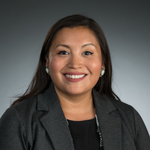ILA Expresses Gratitude

Kristen Talbert
Indigenous Leadership Academy Program Coordinator
Can you believe we are halfway through the inaugural cohort of the Indigenous Leadership Academy (ILA)? We’ve had the honor of having very talented guest speakers during our meetings. We are so appreciative of all our guest speakers for modules two through five. These experts in their respective fields imparted their knowledge, shared their insights, and gave their time to the ILA. You can read more about each of our talented guest speakers below.
Module 2: Understanding Political and Economic Contexts in Indian Country;
Stacy Leeds (Cherokee) is an experienced leader in law, higher education, governance, economic development, and conflict resolution. She serves as Foundation Professor of Law and Leadership at the Sandra Day O’Connor College of Law, Arizona State University. Leeds is Dean Emeritus, University of Arkansas School of Law, and the first Indigenous woman to lead a law school. During her tenure as dean (2011-2018), Arkansas Law achieved the highest-ever rankings: No. 1 Best Value in Legal Education (National Jurist 2014) and 33rd among public law schools (U.S. News 2014). Leeds then served as the inaugural Vice Chancellor for Economic Development at the University of Arkansas (2017-2020). Leeds holds law degrees from the University of Wisconsin (LL.M.) and University of Tulsa (J.D.), a business degree from the University of Tennessee (M.B.A)., and an undergraduate degree in history from Washington University in St. Louis (B.A.).
Module 3: Research, Data, and Indigenous Knowledge;
Alex Soto (Tohono O’odham) is director of the Labriola National American Indian Data Center at Arizona State University (ASU) Library. Under his leadership, the Labriola Center has implemented culturally informed library research support services and Indigenized ASU’s community-driven archives initiative for tribal communities. Alex’s journey to librarianship comes after years of success as a touring hip-hop musician/educator and activist. During graduate school, Alex realized the importance of information literacy within tribal communities and the role of reparative archives in strengthening Indigenous sovereignty. Recently, Alex co-authored ASU Library’s first land acknowledgment statement. Alex believes Indigenous librarianship synthesizes his creative, cultural, and professional backgrounds as well as his commitment to Indigenous self-determination.
Module 4: Innovation and Sustainable Enterprise- Building;
Eunique Yazzie (Diné), entrepreneur, and co-founder of Cahokia Phoenix. If art imitates life, Eunique Yazzie's palette is one that breathes new life and purpose into the arts and culture community; she is a Diné mother, creative advocate, and social entrepreneur from the Navajo Nation. She has founded 3 social enterprises and has been in the creative design industry for over twenty years and in the tech field for five years. Her career timeline has honed her technical skill, challenged perspectives, engaged audiences, and established her artistic dimensions. As a poet, storyteller, and owner of euniQue LLC, Founder, and Strategist of Indige Design Collab, and Co-Founder of Cahokia LLC, she creates an impact on cultural initiatives, place keeping methods, and organizational development. Pivoting towards tech, she is now focusing on design systems for media assets and creative workflow.
Module 5: Response and Responsibility;
Geoffrey Blackwell (Muscogee (Creek) Nation) is the Chief Strategy Officer and General Counsel for AMERIND Risk Management Corporation, Mr. Blackwell joined the AMERIND executive team in October of 2015. AMERIND is a federally chartered and tribally owned risk and financial management insurance company, the only one of its kind in the entire country. Mr. Blackwell is the executive manager of AMERIND’s Legal, Finance, IT, HR, Communications teams, as well as its Broadband team, AMERIND Critical Infrastructure. Mr. Blackwell is a recognized expert in Tribal economic development as well as communications infrastructure deployment. Mr. Blackwell is very active in Federal-Tribal policy advocacy. He has testified before Congress on seven occasions, both as a Tribal representative and as a senior federal policymaker. He has also testified before the U.S. Commission on Civil Rights. He is one of the 2020 Honorees of Public Knowledge’s IP3 Internet Protocol Award for his telecom policy advocacy on behalf of Tribal Nations.
We are very grateful to all of our guest speakers thus far! Keep following us as we unveil the next round of guest speakers.